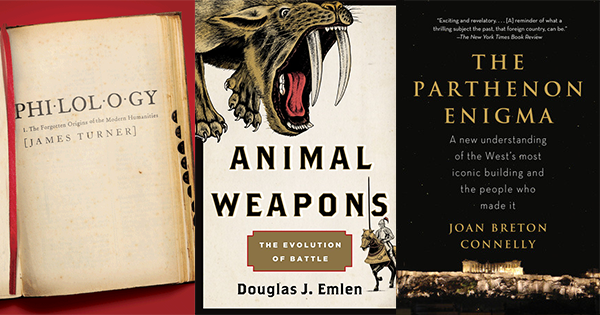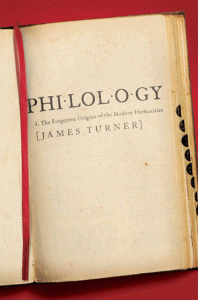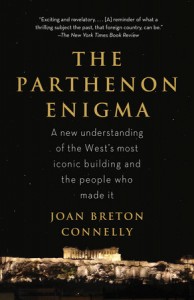
The Phi Beta Kappa Society, which publishes The American Scholar, has announced the winners of its annual book awards. Each award comes with a $10,000 prize and a dinner at the Library of Congress. Congratulations to the winners. The book descriptions below are provided by PBK.
The Christian Gauss Award
Philology: The Forgotten Origins of the Modern Humanities by James Turner (Princeton University Press)
 The word philology was for centuries nearly synonymous with humanistic intellectual life, encompassing not only the study of Greek and Roman literature and the Bible, but also language, literature, history, culture, and art. In Philology, James Turner tells the fascinating and mostly forgotten story of how the study of languages and texts led to the modern humanities and the modern university.
The word philology was for centuries nearly synonymous with humanistic intellectual life, encompassing not only the study of Greek and Roman literature and the Bible, but also language, literature, history, culture, and art. In Philology, James Turner tells the fascinating and mostly forgotten story of how the study of languages and texts led to the modern humanities and the modern university.
One Phi Beta Kappa prize juror said, “I knew that this would be an excellent book, learned and informative. I didn’t realize it would be an extraordinary book, beautifully written. Turner manages a breathtaking sweep of history, never losing sight of his argument or the stakes. Who knew that the subject of polymathic word-love could be such a page-turner, full not only of erudition, but insights, zingers, and apercus.”
More information about Philology can be found here.
The Christian Gauss Award is offered for books in the field of literary scholarship or criticism. The prize was established in 1950 to honor the late Christian Gauss, the distinguished Princeton University scholar, teacher, and dean who also served as President of the Phi Beta Kappa Society. Previous award winners include books by Harold Bloom, Christopher Benfey, Marjorie Garber, and Claudia Johnson.
The Phi Beta Kappa Award in Science
Animal Weapons: The Evolution of Battle by Douglas J. Emlen (Henry Holt and Co.)

Animal Weapons is the story behind the incredible weapons we see in the animal world and what they can tell us about the way humans develop and protect ourselves. Douglas Emlen goes deep into the forests and jungles of the world to explain the processes behind the most extreme of animal weapons, such as claws, talons, and teeth. Animal Weapons analyzes the role of camouflage, the evolution of the rifle, the structures human populations have built to protect their homes and communities, among many other examples.
One Phi Beta Kappa judge called the book a “lively, engrossing account of the arms races in animal evolution, development, and ecology. Emlen is a natural storyteller and the book moves swiftly through different fields of science and military history.”
More information about Animal Weapons can be found here.
Since 1959, The Phi Beta Kappa Award in Science has recognized outstanding contributions by scientists to the literature of science. The intent of the award is to encourage literate and scholarly interpretations of the physical and biological sciences and mathematics. Other award winners include books by James Gleick, Brian Greene, Stephen Jay Gould, and Nate Silver.
The Ralph Waldo Emerson Award
The Parthenon Enigma: A New Understanding of the West’s Most Iconic Building and the People Who Made It by Joan Breton Connelly (Knopf)

Since the Enlightenment, the Parthenon has been recognized as the definitive symbol of Western democratic values. The Parthenon Enigma challenges this conventional wisdom to present a revolutionary new view of this peerless building. Looking back in time, Connelly finds the Parthenon’s true meaning in a web of cultish observances and a unique mythic identity, in which democracy as we know it would have been inconceivable. Marshaling a range of textual and visual evidence, Connelly weaves a thrilling narrative that brings the distant past to life.
One Phi Beta Kappa judge said, “The writing is sophisticated but intelligible; [Connelly] writes for the scholar but makes it possible for a general audience to follow her. The Parthenon Enigma embeds this important symbol of Athens, of Ancient Greece, and of Western Civilization in crucial context, considering it from all angles, literally and metaphorically.”
More information about The Parthenon Enigma can be found here.
Established in 1960, The Ralph Waldo Emerson Award honors scholarly studies that contribute significantly to interpretations of the intellectual and cultural condition of humanity, including works in the fields of history, philosophy and religion as well as such fields as anthropology and the social sciences. Previous award winners include books by Timothy Snyder, Jill Lepore, David Levering Lewis, and Timothy Egan.

